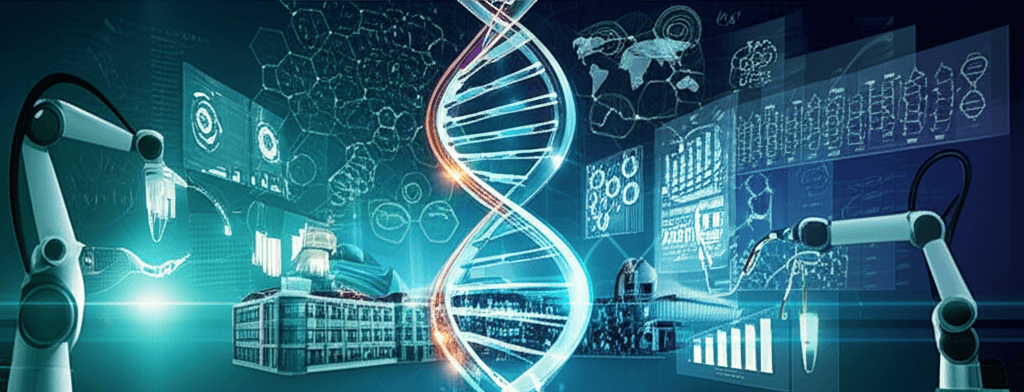Telangana Unveils AI-Powered Life Sciences Strategy with ₹54,000 Crore Investment
Bolstered by a ₹54,000 crore surge, Telangana spearheads AI-driven life sciences, aiming for a $250B ecosystem by 2030.
August 21, 2025

Telangana is cementing its position as a global life sciences powerhouse, leveraging a staggering ₹54,000 crore in investments over the past year to launch an ambitious new chapter of growth.[1][2] At the heart of this strategic push is the establishment of a world-class life sciences university, envisioned as a crucible for future innovation and talent.[3] This move, coupled with significant upgrades to its flagship Genome Valley and MedTech Park, signals a determined effort to not only expand its already formidable pharmaceutical and biotech footprint but also to carve out a leadership role in the burgeoning field of AI-driven healthcare.[3][4] The state's life sciences ecosystem, currently valued at over $80 billion, is on a trajectory to reach an ambitious $250 billion by 2030, with advancements in artificial intelligence and machine learning being a critical component of this growth.[1][5]
The recent influx of over ₹54,000 crore in cumulative investments since late 2023 has been a transformative force for Telangana's economy, setting the stage for the creation of more than two lakh jobs.[6][7] This capital has poured into diverse areas including pharmaceuticals, biotechnology, medical devices, vaccines, and digital health, attracting global giants like Lilly, Amgen, and Olympus to establish or expand their presence.[6][8] This surge has propelled Hyderabad into the elite ranks of the Top 7 global life sciences clusters, the only Indian city to achieve this distinction.[2][6] The state is already a dominant player in the pharmaceutical landscape, contributing to nearly 40% of India's pharmaceutical production and a third of the global vaccine output, earning it the moniker "Vaccine Capital of the World".[1][8] This robust foundation, which includes over 2,000 life sciences companies and more than 250 USFDA-approved sites, has created a fertile ground for this new wave of investment and expansion.[1][9]
A cornerstone of the state's forward-looking strategy is the establishment of the Telangana School of Life Sciences, a premier, world-class university dedicated to fostering cutting-edge research and innovation.[1][4] The institution is being designed to bridge the gap between academia and industry, ensuring a steady stream of highly skilled professionals ready to meet the demands of a rapidly evolving sector.[10] The university's curriculum will be developed in close collaboration with industry leaders such as Dr. Reddy's and Aurobindo, offering a range of programs from short-term certifications to full-fledged degrees.[10] Crucially, the university will feature a specialized AI-life sciences curriculum, developed in partnership with the Centre for the Fourth Industrial Revolution (C4IR), directly addressing the growing convergence of life sciences and artificial intelligence.[10] This focus aims to create innovators and not just graduates, equipped to pioneer new frontiers in drug discovery, diagnostics, and personalized medicine.[10]
Complementing the development of human capital is a strategic focus on enhancing physical and research infrastructure. The government has reviewed and approved significant upgradation plans for its two flagship clusters, Genome Valley and MedTech Park.[9][3] Genome Valley, India's first organized R&D cluster, is slated for a major expansion, with ₹2,000 crore earmarked for its next phase of development across 300 acres.[11] This expansion is part of a broader ₹1 lakh crore strategy to decentralize and develop the life sciences infrastructure beyond Hyderabad into semi-urban areas, creating integrated "pharma villages" in districts like Vikarabad, Nalgonda, and Medak.[10][11] Similarly, the MedTech Park in Sultanpur, the largest of its kind in India, is also part of the state's upgradation plans.[12][4] While there have been reports of delays in land acquisition for its expansion, the park remains a critical asset, housing Asia's largest stent manufacturing facility and exporting medical devices to over 89 countries.[13][14]
The implications of Telangana's strategic initiatives for the AI industry are profound and explicit. The projected creation of over 200,000 jobs will see a significant number of roles in high-growth areas that specifically include AI/ML and advanced healthcare services.[2][9] The state's clear intention is to become a leader in the application of artificial intelligence to the life sciences. The proposed university's dedicated AI-centric curriculum is a testament to this, aiming to produce a workforce fluent in both biology and data science.[10] Furthermore, the government's investment in deep tech, including AI, quantum computing, and robotics, is intended to accelerate research and development, particularly in areas like precision medicine and drug discovery.[15] By fostering an ecosystem where AI is deeply integrated into the life sciences value chain, from research to manufacturing, Telangana is positioning itself as a key global hub for the next generation of healthcare innovation.
In conclusion, Telangana's recent achievements and future plans represent a concerted and well-funded strategy to not only maintain but significantly elevate its standing in the global life sciences arena. The massive ₹54,000 crore investment is the catalyst, but the true long-term vision lies in creating a self-sustaining ecosystem of innovation. By building a world-class university with a specific focus on the intersection of AI and life sciences, and by continuously upgrading its core infrastructure like Genome Valley and the MedTech Park, the state is laying a robust foundation for its ambitious goal of becoming a $250 billion life sciences economy by 2030.[6][5] This integrated approach promises to generate substantial economic growth and employment, while also positioning Telangana at the forefront of a global healthcare revolution driven by data and artificial intelligence.